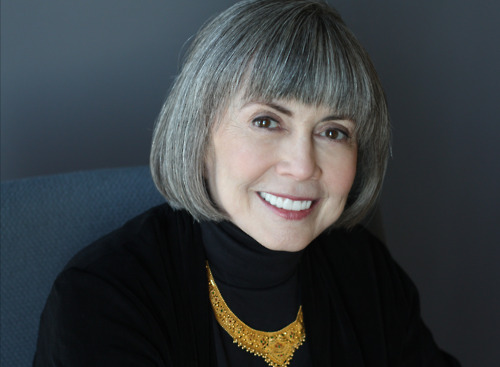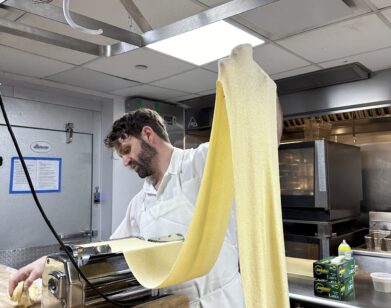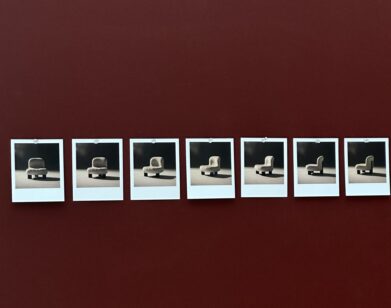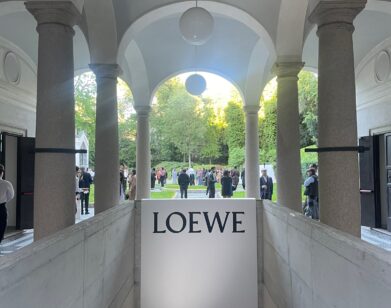Anne Rice Joins the Wolf Pack

ABOVE: ANNE RICE
There is a beast in all of us. In Anne Rice’s The Wolf Gift (Knopf), the legendary supernatural scribe reimagines the werewolf, and what happens when one young journalist’s inner animal is unleashed. Reuben, a San Francisco reporter on assignment in a coastal town in northern California, is enchanted by an old mansion overlooking the sea, as well as its mysterious and sexy mistress. Yet, after a brutal attack at the home almost kills him, he is left with some surprising powers. Exciting, enchanting, darkly sensual and suspenseful, Rice writes of a new sort of werewolf: not wild, but full of human will, driven to destroy evil, albeit in spectacularly bloody ways. Reuben’s personal life becomes increasingly complicated as his “wolf gift” begins to take over. And as he searches for answers as to how and why he can transform into a hungry, howling and powerful werewolf, his search brings him back to the house where he was attacked, ever closer to danger, but also discovery.
Rice’s rich imagination, intense detail for place, psychology and otherworldly powers transform an ancient, malevolently mythic creature into a modern-day hero. We spoke with Rice about the power of place, from New Orleans to Cairo, evil vibes, why human beings are supernatural, the wrestle with mortality behind her writing, revenge, and why the greatest gift is love.
ROYAL YOUNG: Why are we so often captivated with the mystery of places?
ANNE RICE: For me, places have a tremendous impact. I fall in love with places. All of life seems different in different places. It can be New Orleans, Venice, Italy, Cairo or northern California coast. Even as a child, I wondered why everybody else wasn’t madly in love with New Orleans. Why wasn’t everybody else staring at the oak trees and the purple sky and the beautiful houses?
YOUNG: Do you think places have a palpable personality we can feel and pick up on?
RICE: I definitely think they do. Cities have distinct personalities. It’s a matter of knowing it.
YOUNG: Do you think it’s the same with people? Can you pick up a kind of energy they give off? Whether a person is good or evil?
RICE: What I write about in The Wolf Gift is that the person who becomes a werewolf can actually smell evil. Is he picking up odors given off by glands? Is he responding to small gestures that are having an effect on the atmosphere? I don’t know. But certainly I think we all do pick up vibes. Maybe fine scientific instruments could theoretically understand everything we’re responding to. I think we’ve all had that experience of meeting someone and thinking, “This is a dangerous person. This is a very evil person. I feel terribly depressed when I’m around this person.” We get warnings.
YOUNG: I completely agree. I guess I also can’t help but think of the villains in silent movies, who always have dark eyebrows.
RICE: Right. That’s the stylized attempt to portray evil.
YOUNG: Why do we so often dream of supernatural strength?
RICE: I think that we are supernatural. We are unique. We’re the only animals in the universe that we know of that actually have self-consciousness, a sense of time and our own mortality. I think the whole way we treat the supernatural in literature, legends and film has to do with us wrestling with that self-consciousness, our loneliness, our separateness. My husband once wrote a poem for our dog, “You are as intelligent as a creature should be.” I know what he means. We wrestle with this from the time we’re told we’re going to die. When we see a person die, that’s the only seemingly supernatural thing we ever witness. We see the lights go out of that body and we think, “How can that happen?” We don’t know where it goes, or how it went. To me, that’s the basis of why I write novels about vampires, witches or werewolves. I’m wrestling with those things.
YOUNG: You mean your fear?
RICE: Yes, and why do we have self-consciousness? Is there a larger meaning to all of this, or are we simply animals like the birds that sit outside my window? Is it a mistake that we know we’re going to die, or is there a bigger meaning? When you’re writing about a werewolf or vampire wrestling with their supernatural abilities, it’s a metaphor for the struggle of everybody.
YOUNG: Do you think to some degree we all crave a return to this animal form?
RICE: Oh yeah. There are times when we want very much to be contented animals. It can happen when you’re taking a walk. The physical joy of walking rapidly and you forget about death and history. When we’re all feasting together as a family and there’s a feeling of oneness, of everything being okay. But we’re usually just jarred out of that a hundred times a day.
YOUNG: This idea of feasting, and not just with family—in the book, Reuben, the werewolf, feasts in the forest on other animals, and it brings him back to a very primal place. Why is that so enticing?
RICE: I was making up my own werewolf myth of what the transformation is like. What Reuben experiences when he goes out hunting and feasts is being part of that world of animals, where one animal eats another animal. Life feeds endlessly on life. Yet, he’s always aware that he’s unique, because he’s got a human brain. He enjoys it, but never loses his humanity. He’s given an opportunity with the wolf gift to be in both worlds. He’s a little drunk on that power, but he’s also trying to figure out what he should do with it.
YOUNG: In terms of what he can do with it, where do you stand on seeking revenge? Is it right to take retribution on those who hurt us?
RICE: I don’t know that it is. What I have always wanted more than revenge is to bring the other person to recognition of the pain they caused, so they essentially say, “I will never do that again.” This is one reason I don’t believe in hell. The idea that a supreme being would make hell is ridiculous. An eternity of pain that results in no learning, reformation or rebirth is a nauseating idea. It’s one of the reasons I left Christianity. I simply could not accept that version of God.
YOUNG: So how does that play out for you in Reuben’s need to avenge?
RICE: He doesn’t really avenge. He intervenes. Now, he does destroy the person doing the evil. He intervenes in a fatal way. Like a beast, he rips apart. I’ve yet to see my little werewolves go after somebody after the crime.
YOUNG: [laughs] I like savage interventions.
RICE: [laughs] I mean, isn’t there a part of all of us that wants to do that?
YOUNG: Oh, absolutely. How does love help us transcend our human experience? How does it take us higher, out of ourselves?
RICE: I think love can save the world. When we love, we completely recognize the value of the other. When we love and want nothing but good for that person, it’s one of the greatest gifts we possess. You could write a book called The Love Gift.
YOUNG: [laughs] You should.
RICE: Maybe I will.
ANNE RICE’S THE WOLF GIFT IS AVAILABLE TODAY. FOR MORE ON THE AUTHOR, VISIT HER WEBSITE.






